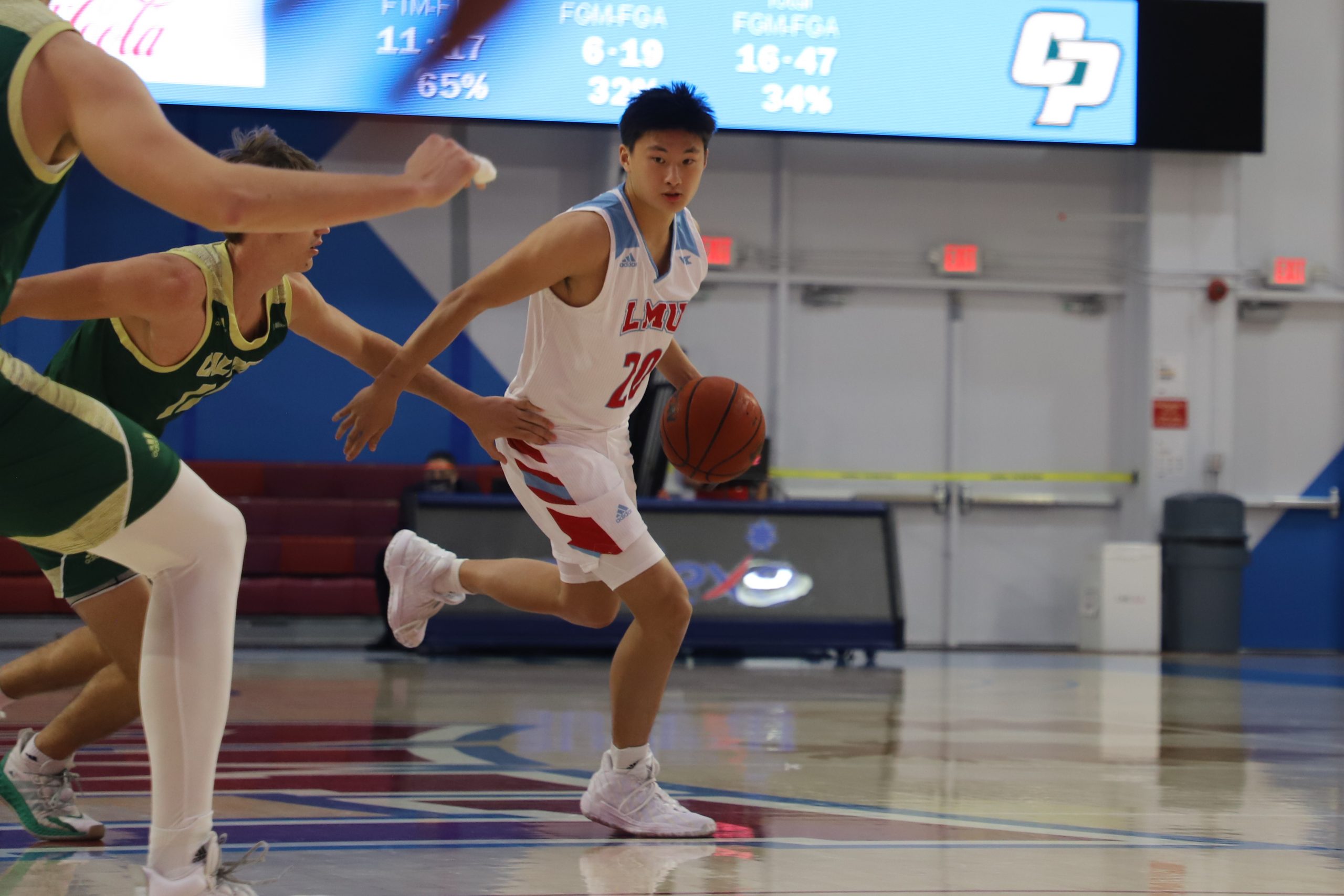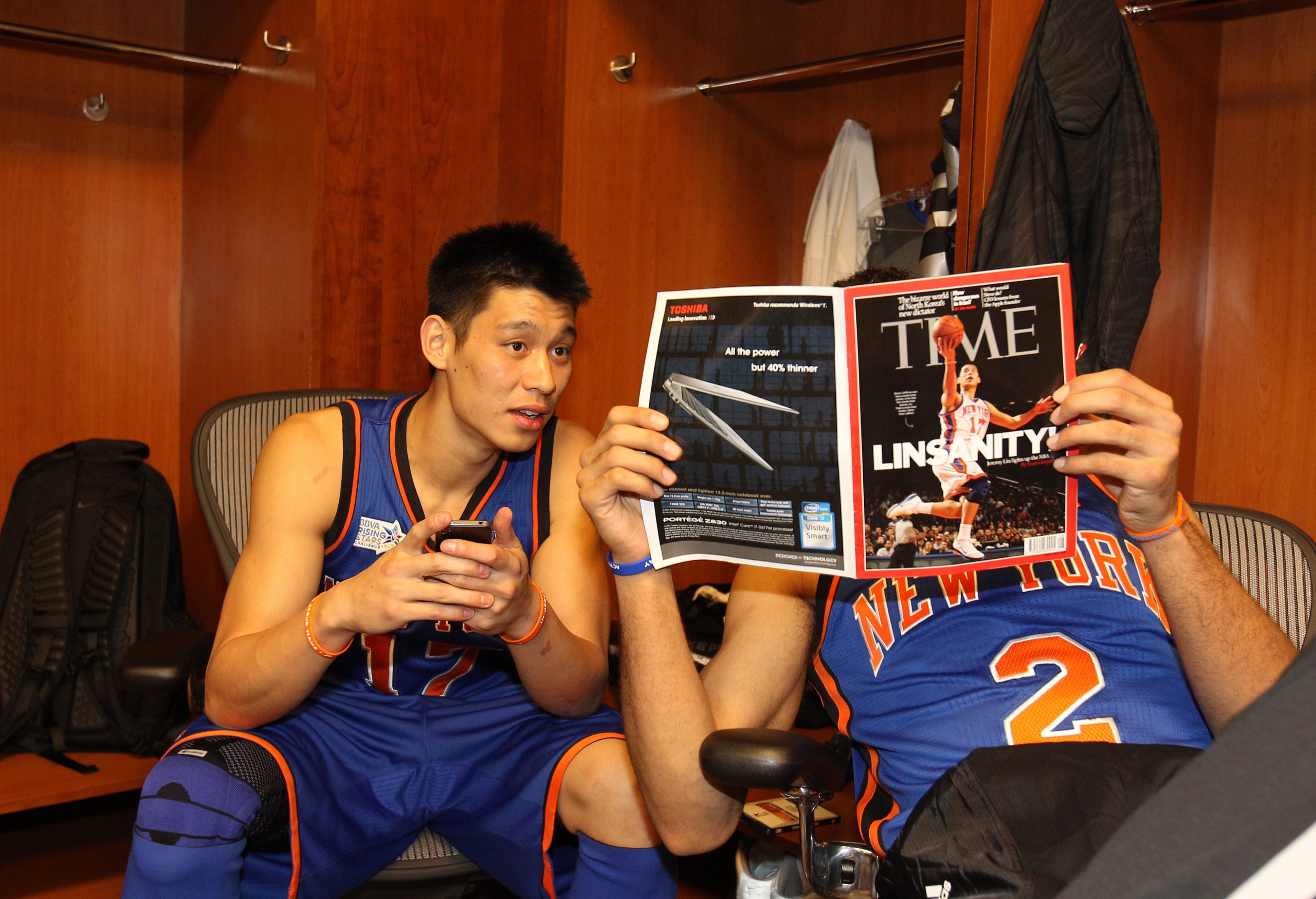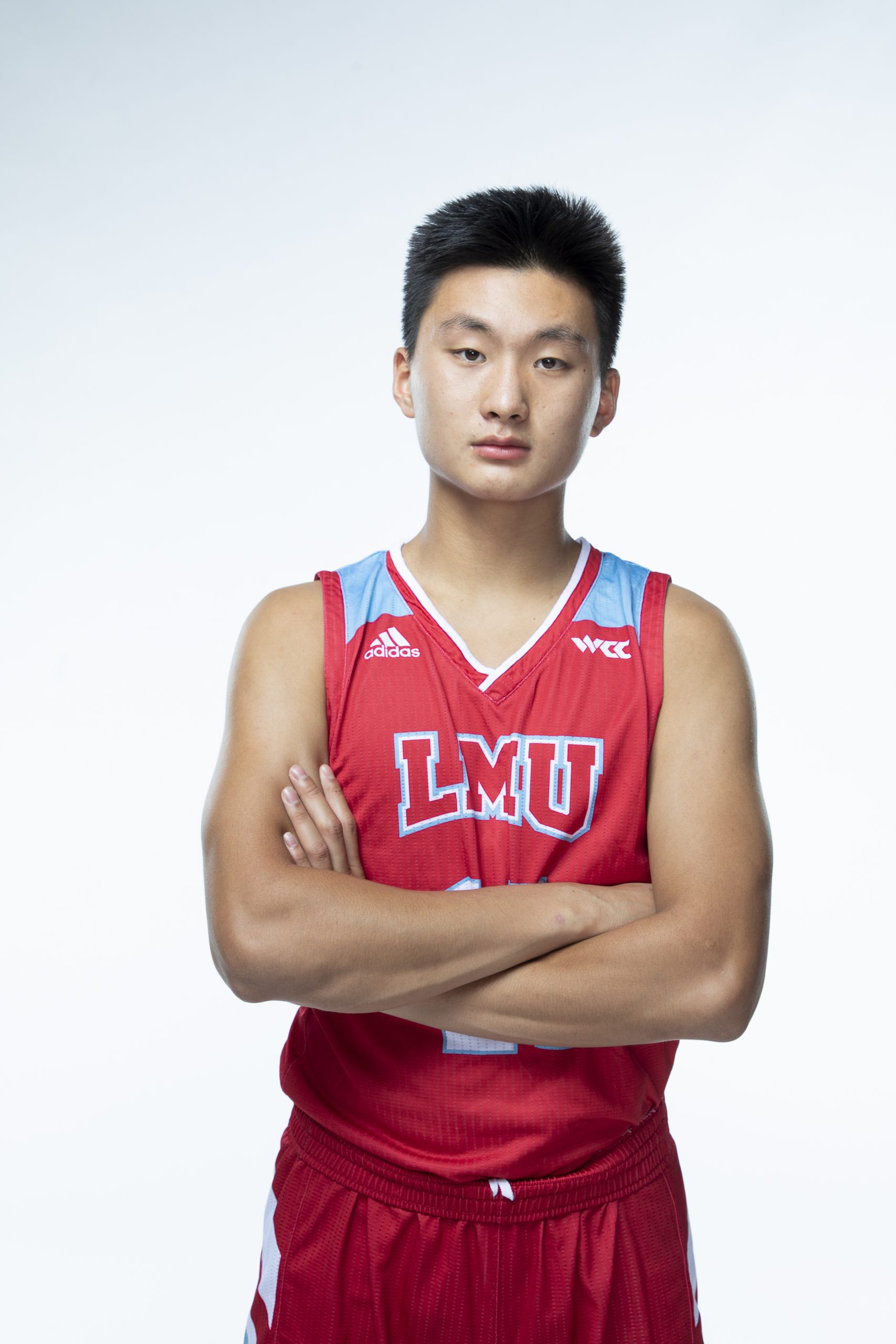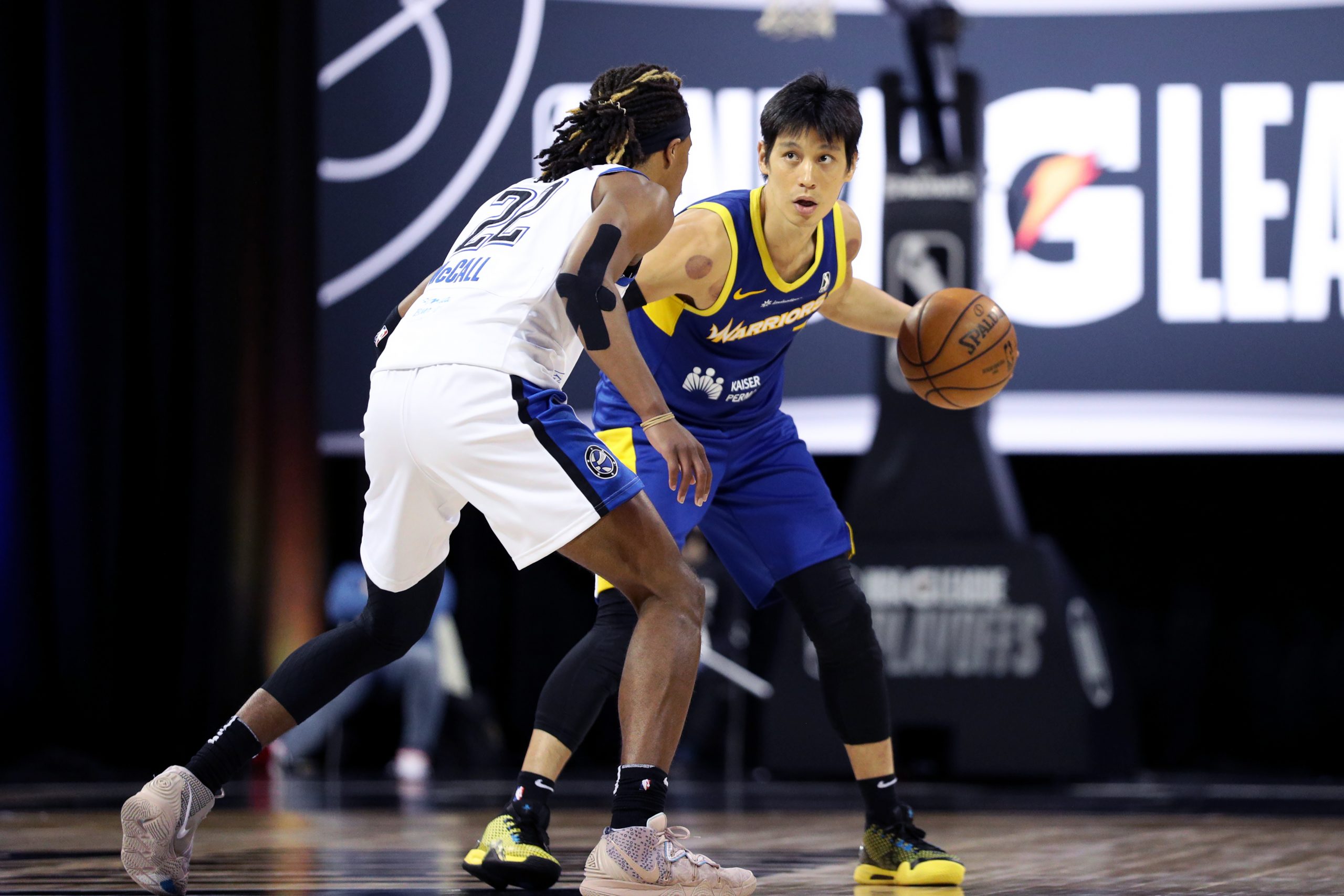May is Asian American and Pacific Islander Heritage Month. This year, it’s happening as anti-Asian hate crimes rise at an alarming rate. In response, the #StopAsianHate campaign has generated nationwide support,
with NBA veteran Jeremy Lin as a leading voice.
For SLAM, Lin sat down with Anthony Yu, an incoming sophomore point guard at Loyola Marymount University, to talk about what it’s like as an Asian American college basketball player today, dealing with anti-Asian racism, being an ally for the Black Lives Matter movement, and how the culture of basketball brings people from all walks of life together.
JEREMY LIN: OK, so if we walk in the gym right now and I give you 100 spot shots, from your favorite spot on the court, three pointers, how many you making?
ANTHONY YU: You know, I say a cool 70. What about you?
JEREMY: Me? If you’re asking me if I walk into the gym, 100. Will I make 100, who knows? But if you’re asking me how many I’m going to make, I’m saying 100.
That’s just something we’re working on for me. I mean, a big part of what I’ve been working on is my mindset and things like that. When I was in college, when I was your age, I would’ve been cool with 60, 65 maybe.
So year one for you [at Loyola Marymount University], what was that like?
ANTHONY: It was a big learning experience, playing with all these great players here at LMU, you know, I was able to learn a lot. Yeah, we had a pretty good year, we made it to the second round of the WCC conference tournament.
JEREMY: What’s goal 1, 2 and 3 for this offseason in terms of, Man, I need to take that jump if I want to crack the rotation, if I want to be a great collegiate player…what does that look like for you?
ANTHONY: For me, I wasn’t blessed with really elite height or athleticism, so to improve my athleticism so I could run with those guys out there is a big part of my game and just getting bigger and stronger. You know, being Asian, people automatically first look at you like, you’re going to be perceived as weak, so just kind of trying to break into what’s called the eye test.

JEREMY: Do you feel like you get everyone’s best shot, or do you feel like people don’t even take you seriously, or is it a combination of both?
ANTHONY: That’s a great question. In the beginning, I feel like they don’t take me seriously, but then once I start getting buckets, they’re like, Alright, hold up, let me lock in and really go at this guy. Because no one wants to be embarrassed by Asian kids, you know?
JEREMY: I hear you on that. I want to hear your specific hoop dreams, because that’s something you’ve talked about, and one thing that I love about the process and journey is that there is always this theme of—especially as an Asian kid or an underdog—that you have to believe it and see it happen before it actually happens.
ANTHONY: You know, my hoop dream ever since I was a kid, I always watched the NBA, so if I’m fortunate enough one day to be blessed to make it to that level, I’d be really appreciative of that. That’s a top goal for me. I don’t want to look that much into the future because I kind of want to live in the present, but my goal is to aim for the top, and if I make it, I feel like I’ll be able to inspire a lot of other people, just like yourself.
JEREMY: One thing I appreciate is how you shared how I’ve been able to inspire you. Thinking back on the night I had a chance to play against the Lakers and scored 38 points when I was with the Knicks, where were you?
ANTHONY: On that night, I was in fourth grade. I was watching the game with my family and Jeremy, the impact you were able to have—my parents never watched an NBA game before. And having my parents want to watch you is a very big deal. And yeah, I was just watching the game as a fourth-grader, getting hyped every time you scored. I was playing basketball at the time, too, so I felt like if you could do it, then I could. Because often in American media, Asians don’t get enough representation, so seeing someone just like myself do it, it gave me the confidence that I could do it. And my mom told me all the time, If Jeremy Lin can make it then you can, too. She used to always tell me that when I was down. So yeah, that game had a really big impact.

JEREMY: I appreciate that, and I am rooting for you. I know you had a cool mixtape you uploaded onto YouTube that got hundreds of thousands of views. Can you talk about that and the reaction to what happened?
ANTHONY: It was my eighth grade summer going into my freshman year. We played the Oakland Soldiers, and at the time, they had the No. 1 player in the nation and we lost, but I scored 40 on them. And my dad uploaded the video on YouTube and then another media company posted it and got over 150,000 views. As a 14-year-old, I wanted to read the comments to see what people were saying. One that really stuck out with me was some guy who said, In 10 years nobody will know who Anthony is and Asians are not genetically gifted enough to play basketball. They are too skinny and fragile. And it just made me question, like, why are people writing off a 14-year-old just because of race?
JEREMY: How did you cope with it? I’m glad I can ask you this question because my whole life, everyone’s been asking me how did I handle that.
ANTHONY: As a 14-year-old, I don’t think I dealt with it really well. It kind of made my attitude want to prove him wrong. I thought that attitude kind of wasn’t healthy for me. Just with things going on at the time, just reading all this stuff. It makes you just so angry, you know? I feel like I didn’t deal with it the best way I could. And when I played basketball, I would play for other people and worry about how other people viewed me.
JEREMY: That’s amazing to hear. I mean, I didn’t learn that lesson as young as you did. I love hearing that, and that’s a perfect segue for us to talk about this political climate with a pandemic and everything. What are your thoughts on the violence we’ve seen? It seems to me as Asian Americans, we’re disrespected but on full display, and it’s getting even worse at times. People think it’s OK to attack all Asians, even younger ages and older Asians. It just seems like a wild time. What are your thoughts on it, especially as an Asian American basketball player?
ANTHONY: I feel like Asian hate is socially accepted in this country. It has been normalized and socially accepted without a doubt. I feel like our elders are the ones who are most vulnerable because many of them have been voiceless in America for a while now. But with this younger generation and with the help of people like you, it gives us confidence to speak out and use our voices because no one else will.

JEREMY: Give me a little more on the perspective you have, because when I came in, my parents couldn’t speak English perfectly. So they lived that immigrant life, and I didn’t actually understand a lot of issues, even when I went through Linsanity. I didn’t understand all the issues. Like, there’s direct racism, and there’s so much more to it, and there’s so much complexity and so many microaggressions and stuff like that. Basketball culture and even the NBA has really progressed. Especially with social justice, there’s this unique voice that basketball culture can tie into the social justice issue that we’re seeing.
Can you talk a little bit about basketball culture and why you think basketball culture has been so influential in the social justice movement?
ANTHONY: Basketball really brings a lot of people together in this world, you know? No matter what color your skin is, if you can ball, you can have that mutual relationship with other peers. And the whole culture of playing basketball, traveling the world and traveling America, being around a certain group of people over a long period of time brings people together.
JEREMY: I mean, it’s the same for me. Like I’ve always said, basketball and sports in general is unified. And there’s things that unify people. It can be sports, basketball, music, food, the dinner table. These are all things that unite and bring people together. The best thing I love about basketball is that it’s a team sport, and it’s all about the team. Especially now, because we’ve seen the NBA become outspoken. When you originally watched the NBA vs now and even in the last 15 years, how global the game has become. So many European players, African players, Asian players…it’s become a melting pot. And that is a microcosm of what we want the world to look like.
And like you said, when you step on the court, it doesn’t matter what ethnicity you are. It’s you can hoop or you can’t. Or you won or you lost. I feel like there’s this even playing ground when the game begins, nothing else matters. And that’s what we are shooting for in life. We don’t let people on the court based off what they look like. Everyone has an equal shot. And that’s what I think justice is. And basketball culture is very much in that conversation.

ANTHONY: I feel like we can just learn so much from different cultures. Especially with the Black Lives Matter movement and events like [the passing of] George Floyd and all the rally movements. It really educated me on the severity of the discrimination against the African-American community. And I was able to see so many people from my age and people that don’t have big platforms coming together. It showed me the power a regular person can have. And I feel like today, you don’t even need to be a celebrity for your voice to matter. You don’t need a big following to speak up and voice your opinion.
JEREMY: When the police brutality was at its peak, I was with the Brooklyn Nets and—again, because of basketball, we’ve had different exposure—I was able to see my teammates, who are African-American, how much of a toll it was taking on them. These are guys who will be in an arena with people cheering for them, but if they go down the street, they can be pulled over and they don’t know what’s gonna happen. They don’t know if they’re gonna live and they fear for their lives. And that gave me a much deeper appreciation for my African-American teammates. As well as a conviction and a challenge to myself on who I want to be as a person. I can’t just turn a blind eye or only care about Asian issues. A lot of this was inspired by the Black Lives Matter movement and what they were going through. And that’s what drives me today, to be more educated and a better ally. And that’s why we talk a lot about allyship.
With #StopAsianHate and all the people that are watching, what can people do and what would you suggest?
ANTHONY: I feel like people can just spread the message and talk to your peers of different cultures. Really learn about what their lives are like and bring it into your own perspective. Just relate it to yourself and educate yourself.
JEREMY: You went and educated yourself, had conversations with your teammates to learn about them and different things. You went to learn about Black Lives Matter. You went and had conversations with different people.
I think the hard part is, people feel like they have to know everything to do something. Sometimes doing something is just learning a little, and I’ve always said it starts with dialogue. And that’s what I like about basketball…basketball starts that dialogue.
No excuse, we can all start there.
—
Photo credit via Getty Images and LMU Athletics.